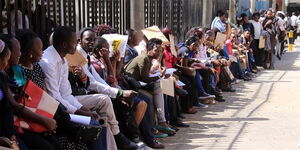The livelihoods of thousands of Kenyans employed by firms exporting goods under the African Growth and Opportunity Act (AGOA) are at risk, with business leaders warning of major setbacks if the trade pact with the U.S. is not renewed.
AGOA, a crucial U.S. initiative that allows duty-free exports from eligible sub-Saharan African countries—including Kenya—is set to expire in September 2025.
Company executives, including those from Levi's and Wrangler jeans companies, have cautioned that failure to secure a new deal could subject their products to tariffs under President Donald Trump's administration, making them less competitive in the American market.
At the United Aryan export processing zone in Nairobi, the future of thousands of workers hangs in the balance. Managers there told AFP that if the agreement lapses, it could spark significant economic disruptions and jeopardise the factory’s operations.
The factory's founder, Pankaj Bedi, revealed that Kenyan companies would be unable to compete well in the U.S. markets if the agreement is not renewed.
Further, he urged the US President to consider extending the deal for a longer time, as the trade benefits have been mutual between the nations in the pact and the U.S.
If AGOA expires without renewal, more than 60,000 Kenyans stand to be affected, particularly those in the textile and apparel sectors that depend heavily on duty-free access to the U.S. market.
An estimated 50,000 to 55,000 Kenyans are directly employed in export processing zones (EPZs) since the programme started in 2000, where the majority of garments are produced for export under the AGOA framework.
In addition, a further 10,000 to 15,000 people benefit indirectly through related supply chains—including cotton farmers, transporters, food vendors, and support staff working around EPZs.
Without AGOA, meant to benefit African nations that meet certain U.S. expectations in areas including governance and human rights, many Kenyan goods would no longer have duty-free access to the U.S. market. And they would be exposed to the uncertainty of the Trump administration’s global tariff campaign, according to AFP.
With the current AGOA deal set to expire in September this year, the government of Kenya, represented by Treasury Principal Secretary Chris Kiptoo, engaged officials from the US government, including Constance Hamilton, Assistant US Trade Representative for Africa, on how the deal could be renewed on April 22, during the 2025 IMF/World Bank Spring Meetings in the US.
During the meeting, the parties, which included representatives from other African nations, explored discussions on how the tariff policies impacted the trade relations between the two nations.
The US President imposed a 10 per cent tariff on goods from Egypt, Morocco, Kenya, Ethiopia, and Ghana. Kenya's exports to the US are estimated at around Ksh109.7 billion (USD784 million).












